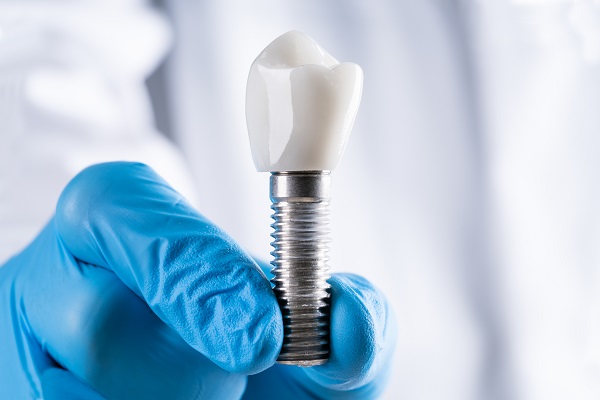Is Getting a Dental Implant and Crown Painful?

Many who need dental implant and crown procedures put off the treatment of out fear that the procedure will be painful.
Understanding what pain comes with the procedure can calm anxiety and allow those who are afraid to follow through with the treatment.
Pain from a Dental Implant and Crown
Dental implant and crown placement involves some pain and soreness. That said, it may not be to the extent or in the way you may think.
The following is everything to know about dental implant and crown treatment, including when and how the process is painful.
What is a dental implant and crown?
A dental implant is a small metal post that fuses to the jawbone. This allows dentists to mount a replacement tooth, such as a dental crown, onto the implant.
A dental implant most commonly serves to replace a missing tooth or many missing teeth. There are several reasons a dental implant may be necessary, including to ensure a crown or dental bridge sits properly in the mouth.
Although a dental implant does have a surgical component, the operation is safe and simple for most dentists to perform.
How is a dental implant and crown placed?
The first step in placing a dental implant is to remove any damaged teeth that are problematic and then clean the affected area, after which the dentist prepares the jawbone. In many instances, there is not much preparation that is needed, while in some other cases bone grafting may be necessary.
After the preparation is complete, the dental implant surgery occurs. In essence, the operation involves opening the gums and placing the dental implant into the jawbone. It may take several weeks to heal and for the dental implant to fuse with the jawbone. At this point, the abutment, such as a crown, is placed onto the dental implant.
Does dental implant and crown placement hurt?
Since most patients receive anesthesia for dental implant surgery, the surgical component is typically not painful at all. That said, there is likely to be discomfort following the operation. It is important to plan for several days away from work to ensure proper healing.
The pain or soreness following dental implant surgery generally lasts between up to 10 days. You can manage it with proper home care and pain medication. In the event the pain continues for more than two weeks, you should visit the dentist to ensure the healing process is going according to plan.
How to manage pain and soreness after treatment
The best way to cope with the pain and soreness after dental implant treatment is to take pain medication. Be sure to ask your dentist about what pain relief medication is the most effective.
Additionally, avoiding hot and cold beverages is always a good idea after dental implant placement. Be sure to practice good oral hygiene, which should include a consistent brushing schedule, flossing and using mouthwash every day as well as checking your mouth for any signs of oral health concerns.
Are you considering a dental implant in the Reading area? Get more dental implant information at https://muhlenbergdental.com.
Recent Posts
Dental implants are artificial teeth roots that can be used to replace missing teeth. A tooth can be knocked out by trauma to the face, or it might fall out due to bone loss caused by periodontal disease or severe tooth decay.Most people will lose at least one of their teeth at some point in their…
Thinking about getting dental implants to take care of your missing tooth problem? Implants are commonly chosen by dental patients who are in need of tooth replacement services. While there are other replacement options available, these do not offer the unique benefits that implants do. One of these benefits is preventing jawbone loss, which is…
Learning more about how dental implants work will help you when it comes to choosing a tooth replacement option. The entire implant placement process can take many months to complete, which means you need to make sure this is the right replacement option for you. One of the many reasons people who are missing teeth…
Dental implant surgery involves the replacement of missing teeth with a surgically inserted metal post. This oral surgery is becoming increasingly popular every passing day. If you are considering dental implants, you will need oral surgery. You should prepare early for the procedures that may be involved.A patient may need oral surgery to resolve problems…


